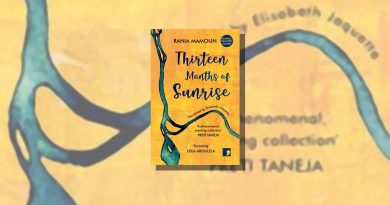Sleepers Awake by Tree Riesener
– Reviewed by Jenny Booth –
Sleepers Awake is the debut short story collection by Tree Riesener, also a published poet. The nineteen stories have broadly religious (mostly various forms of Christian) themes, with occasional exceptions such as an alien abduction.
The stories however, are less concerned with theology than with using it as a device to explore human behaviours and attitudes, towards both the spiritual and the worldly. The Apocalypse appears as a metaphysical four minute warning to stir, or not, the inhabitants of the stories out of their bourgeois preoccupations. A couple listen to radio announcements to find out if their children’s school is closed, as if they are only capable of imagining the Second Coming as a particularly heavy snowfall. Jesus reappears as a hobo to his expectant congregation, only to find himself subjected to various imaginary reincarnations that they find more palatable, including a preppy catalogue model and unthreatening manger-age infant. (This story also suggests the collection has evolved over some time; hobo Jesus identifies one George Bush as the harbinger Anti-Christ). Other religious tropes that pop up are demon lovers (one blots his demon credentials by genuinely falling for his human lover, while another deviously tricks his into granting him a second chance by promising to be more attentive and curb his cable TV habits), the Fall of Man, the use of religious relics and knick-knacks.
This material is often treated in a humorous way, gently poking fun at human tendencies towards hypocrisy and side-stepping the big existential questions; however, the standout stories or moments in the collection come about where space is allowed for more serious consideration of their topics. One of the recurring themes is loneliness. In ‘On the C Bus’, an elderly couple’s routine is disrupted by an ambiguous earth goddess type who appears as a sex worker on her way home from the night shift. This chance meeting leads to a spiritual and sensual awakening of warmth between the couple, which is surprising and touching. In ‘Technical Manuals Aren’t Written Very Well, Are They?’ an alienated laboratory worker creates a bonsai world complete with two miniature human clones (Adam and Eve) to entertain herself. The narrative unfolds efficiently and enticingly, cultivating the reader’s concern for the fate in store for the tiny creatures. This leads to one of the more disturbing points in the book,
Picked Adam up and put him on top of Eve. She started to squirm and hit him, so I had to say ‘SIN’ to her, and she quieted down.
How’s that for a succinct Spare Rib critique of organised religion’s historical attitudes towards women? Unfortunately, the story’s tension seems to wane, perhaps reflecting the writer, like the experimenting narrator, having difficulty in knowing ultimately what to do with her original creations.
This is a criticism that could be applied to the collection as a whole, that the creative and thought provoking ideas are required to work hard to sustain nineteen individual stories. Even though Riesener derives much from the conceits she sets up, many of the collections’ pieces return to similar scenarios. For example, a later story has an immature child god experimenting with another Eden-like world away from his parents’ eyes (spoiler: it doesn’t end well for the denizens). Does this add to or dilute the impact of the earlier piece? In the flash piece ‘Hungry’, a young girl deals with neglectful, punitive parents and the illness of her more nurturing grandmother. This is written insightfully and sensitively, commenting on scale and perception of events from a child’s point of view, and how literal-minded children can (mis)interpret the more pragmatic beliefs expressed by adults. ‘Hungry’ is followed by the longer piece ‘The Crucifixion Party’, where the confusion and action of the story is also driven by a girl (possibly the same character) making the mistake of taking her parents’ platitudes literally. Perhaps these stories stand independently of each other; the flash piece has been published elsewhere. However, it is tempting to think that they could have been condensed to make more effective use of their most interesting parts. A further quibble is that the situational problems posed by Sleepers Awake are not always the most original. ‘What would Jesus do if he returned to Earth?’ or ‘What if a materialistic person learnt to value the spiritual and believe in themselves?’ are questions that have been extensively posed by a variety of media, even if Riesener does find her own individual and engaging way of answering them.
Sleepers Awake is a first story collection that has already won a prize (The Eludia Award). If the killer:filler ratio drops off occasionally, overall it presents diverse and unusual points of departure that are adeptly and wittily explored to their conclusions.






